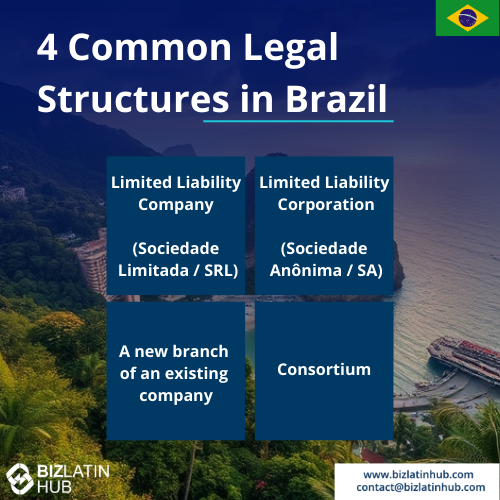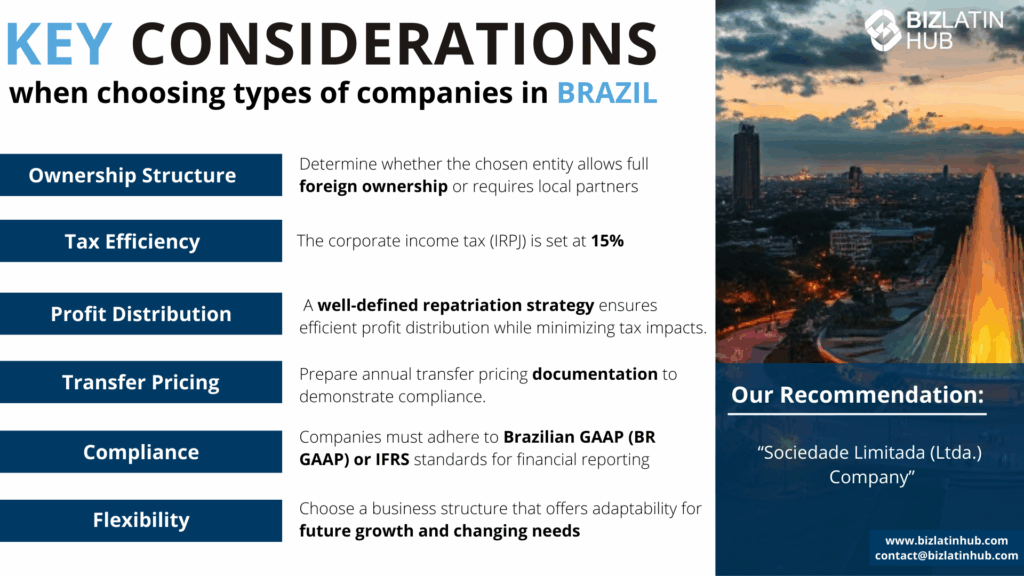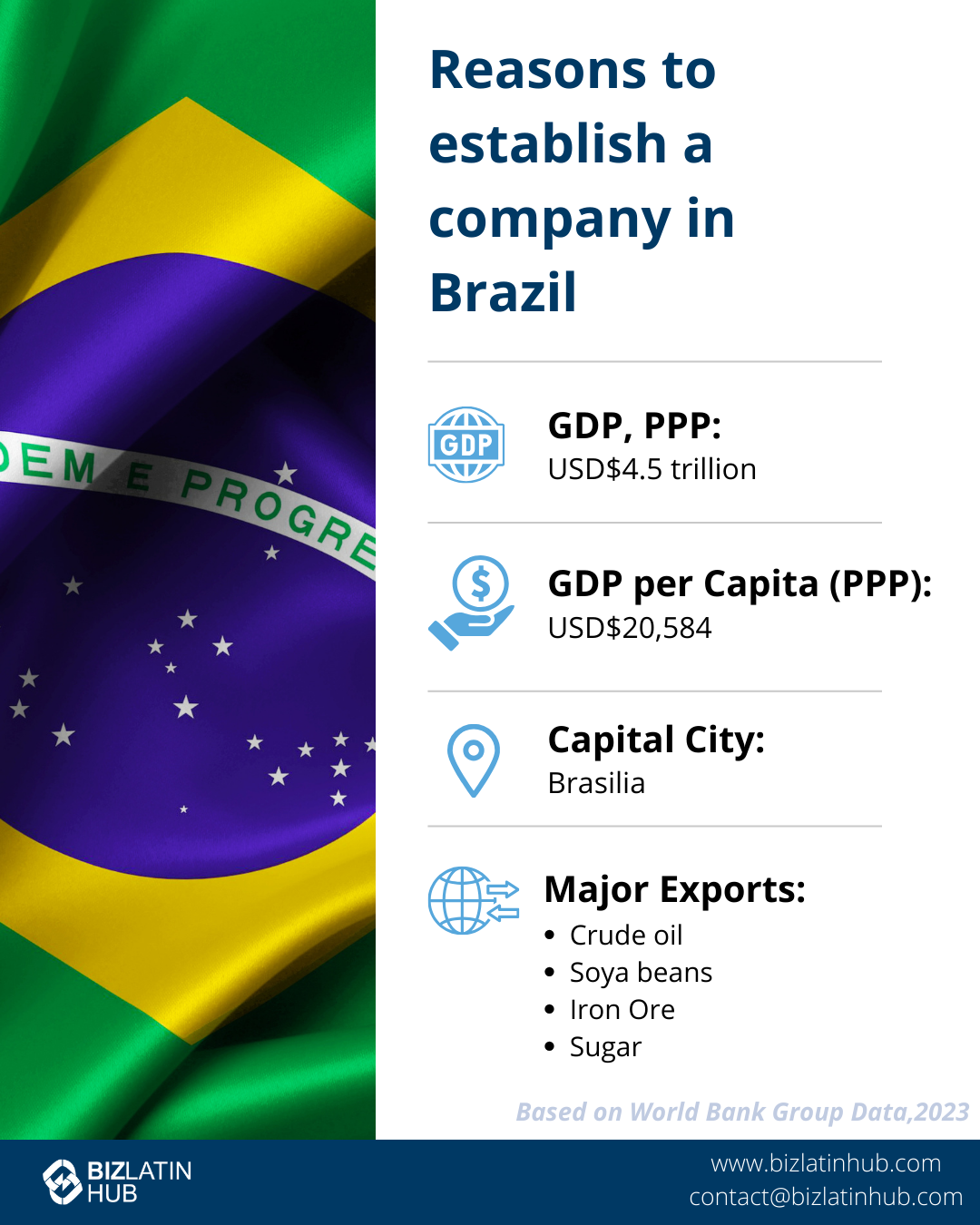Brazil is the largest economy in Latin America, offering vast opportunities for foreign companies. To do business locally, selecting the right legal structure is critical. Whether you’re planning on company formation in Brazil, joint venture, or foreign branch, this guide will walk you through Brazil’s main company types (including LTDA, S/A, and foreign branches) and how to select the best structure based on your goals.
Key Takeaways
| What are the common legal entity types in Brazil | Limited Liability Company (Sociedade Limitada / Ltda.). Limited Liability Corporation (Sociedade Anônima / SA). Consortium. |
| What is the most common Brazilian company type? | The “Sociedade Limitada” (‘Ltda.’), which is equivalent to an LLC in the US is the most common company type in Brazil. Its popularity stems from its speed, flexibility, and investor-friendly features, which suit both domestic and foreign businesses. |
| What are the primary considerations when choosing a business entity in Brazil? | Ownership Structure. Tax Efficiency. Profit distribution. Transfer Pricing. Compliance. Flexibility. |
Main Legal Structures for Companies in Brazil
The 3 main company types of options in Brazil are:
- Limited Liability Company (Sociedade Limitada / Ltda.).
- Limited Liability Corporation (Sociedade Anônima / SA).
- Consortium.
In Brazil, the minimum capital requirement for incorporating a commercial company varies by entity type, but it is generally low for most businesses. For an Ltda., no minimum capital is legally required, though the shareholders or partners may define an appropriate amount. Foreign investments can be repatriated, but the process may involve compliance with foreign exchange regulations. Additionally, foreign investors who meet certain criteria may be eligible for a visa, such as the investor visa, depending on the investment size and activity.
The main steps to incorporate a company in Brazil include:
- Formalization of company bylaws.
- Registration with the Brazilian Federal Revenue (CNPJ).
- Opening a Brazilian bank account.
Comparison Table: Key Legal Entity Types in Brazil
| Entity Type | Best For | Shareholders | Liability | Legal Personality | Tax Status |
|---|---|---|---|---|---|
| LTDA | Most common for SMEs and foreign investors | 2+ (or 1 if MEI/EIRELI) | Limited to capital | Yes | Corporate tax (IRPJ, CSLL) |
| S/A | Public companies or capital-raising firms | 2+ | Limited to capital | Yes | Corporate tax applies |
| Branch | Foreign companies operating directly | 1 (foreign HQ) | Parent company liable | Yes | Taxed as Brazilian entity |
LTDA – Sociedade Limitada
Who should choose this: Most common choice for foreign companies entering Brazil. Offers liability protection, flexible management, and fewer formalities than S/A.
S/A – Sociedade Anônima
Who should choose this: Larger enterprises or companies planning to raise capital via share issuance or stock market.
Branch
Who should choose this: Corporations that wish to operate in Brazil under direct control of the parent company. Requires special government authorization and implies full parent liability.
1. Sociedade Limitada (LTDA)
One of the most common company types in Brazil is the limited liability company, known locally as a limited society (Sociedade Limitada) or Ltda. This type of legal structure in Brazil is similar to a limited liability company (LLC) in the United States.
A key benefit to the limited liability company in Brazil is the fact that each shareholder’s responsibility is tied to their assigned capital — or in other words, it is based on their investment.
Some characteristics of the Brazilian limited society (Sociedade Limitada):
- No minimum or maximum capital is required unless the entity is involved in trading or hiring foreign individuals as managers or directors
- This type of entity is incorporated through an Article of Association which needs to be registered with the Board of Trade
- Only one shareholder is needed. They don’t need to be a resident and there’s no minimum or maximum percentage of interest ownership
- Non-residents must be represented by an individual resident in the country
- An Ltda. cannot be registered or sell shares in the stock exchange
- Any quota holder holding more than 75% of the quotas has effective control of the entity
- A member cannot sell shares without the approval of the other shareholders
2. Sociedade Anônima (S/A)
Limited liability corporations, locally referred to as an anonymous society (Sociedade Anônima) or SA, are regulated locally by the Law of SAs. These are closest to what’s known as a Subchapter C Corporation in the United States.
This type of legal structure in Brazil can issue different classes of shares (voting and non-voting), while liability among shareholders is limited to the payment of shares to which the shareholders have subscribed.
Corporations can either be publicly traded (known as a Sociedade por Ações Aberta) or closed (known as a Sociedade por Ações Fechada), meaning the shares and securities will not be available to the general public.
This type of entity is popular among larger corporations interested in seeking to raise funds .
Some characteristics of the SA in Brazil include:
- At least two shareholders are required (natural or legal persons, resident or not)
- The corporation’s capital must be completely subscribed and 10% must be deposited in a bank account as part of the incorporation process
- At least 5% of annual net income needs to be set aside in a legal reserve until it reaches 20% of capital
- Financial statements must be filed with the local commercial registry and published in the Official Gazette
- An SA must have a board of directors (who are fiscal residents of Brazil or hold residency) and an administrative council (who can be non-resident foreigners)
3. Consortium
A consortium is the gathering of corporations of other companies with the aim of performing a particular operation or activity. Consortiums are unincorporated entities where two or more members take part in trade, business, financial operations, or ventures, and share profits.
Some characteristics of a consortium in Brazil include:
- A consortium is established through a consortium agreement
- Partners are responsible for their own obligations and liabilities, as set out in the consortium agreement
- That same agreement will define the aim of the consortium and establish each partner’s rights and obligations
- The consortium agreement must be filed with the local board of trade in the same jurisdiction as the main office
- A consortium is not regarded as a taxpayer, like other types of companies in Brazil
Our Recommendation: The Limited Liability Company (Sociedad Limitada / Ltda.) structure provides flexibility in management and ownership, typically requiring fewer formalities compared to a Sociedad Anônima (SA).
Branch of a Foreign Company in Brazil
When choosing a Brazilian company structure, it’s worth considering the possibility of incorporating a branch. However, this process can be lengthy and costly, taking up to six months to complete, and may involve higher costs than other types of company formation.
In order to set up a branch office in Brazil, it’s necessary to demonstrate the existence of a legal entity in another jurisdiction, including a copy of the articles of incorporation and list of shareholders, among other documentation. All documents must be officially translated, legalized (notarized or equivalent), and certified by a Brazilian consulate.
A certain amount of capital must be allocated to the new branch,
Some characteristics of a branch office in Brazil include:
- Remittances of profits are exempt from withholding tax
- Special authorization to open a branch of a foreign corporation must be issued by the Ministry of Development, Industry, and Trade.
- A foreign branch office can only start operations once registered and its authorization and proof of documentation have been published.

Choosing the Right Legal Entity in Brazil
The key considerations when deciding on which is the best entity type in Brazil are the following:
Ownership Structure
Understand whether your chosen entity allows full foreign ownership or requires local partners, as this varies by sector in Brazil. Certain industries, such as aerospace, media, and energy, have specific restrictions that favor local participation or impose quotas. Being aware of these limitations will help align your business structure with local laws, ensuring long-term operational compliance and stability.
Tax Efficiency
Evaluate the implications of Brazil’s corporate tax framework on your business profitability. The corporate income tax (IRPJ) is set at 15%, with an additional surtax of 10% on income exceeding BRL 240,000 annually, while social contributions (CSLL) are typically 9%. Additionally, indirect taxes like PIS/COFINS and ICMS can significantly impact your cash flow. Explore tax incentives such as those offered in free trade zones like Manaus or programs supporting innovation and export-oriented businesses. Strategic tax planning is crucial to minimize costs while adhering to Brazilian tax laws.
Profit Distribution
Factor in how Brazil’s tax system affects profit distribution. While dividends are currently tax-free at the shareholder level, corporate taxes are applied before distribution. However, ongoing discussions about tax reform could alter this framework in the future. Understanding double taxation treaties and planning repatriation strategies is critical for businesses owned by foreign entities to optimize shareholder returns and reduce tax exposure.
Transfer Pricing
Ensure compliance with Brazil’s detailed transfer pricing regulations, especially for cross-border transactions between related parties. The country uses fixed-margin methods, which differ from OECD guidelines. This makes compliance particularly important for businesses involved in imports, exports, intellectual property transfers, or intercompany financing. Prepare accurate documentation and annual reports to demonstrate adherence to these rules and mitigate audit risks.
Compliance
Prepare for Brazil’s extensive compliance obligations. Companies must adhere to Brazilian GAAP (BR GAAP) or IFRS standards for financial reporting, depending on their size and sector. Regular filings for taxes, payroll, and social security are mandatory, and non-compliance can lead to significant penalties. Larger entities may also be subject to annual audits. Understanding and meeting these obligations is essential to maintain your company’s legal standing in Brazil.
Flexibility
Choose a business structure that offers adaptability for future growth and changing needs. The Sociedade Limitada (Ltda) is commonly preferred for its simplicity and limited liability, while the Sociedade Anônima (S.A.) allows for raising capital through investors or public offerings. Alternatively, the Empresa Individual de Responsabilidade Limitada (EIRELI) is ideal for single shareholders seeking liability protection. Flexibility is vital in Brazil’s complex regulatory environment, where adjustments may be necessary to respond to market dynamics or regulatory changes.
Note: Our recommendation based on experience would in most cases to incorporate a Sociedade Limitada (Ltda.) company in Brazil, which is similar to a US Limited Liability Company (LLC).

Steps to Incorporate a Company in Brazil
To operate locally, companies must complete six principal steps for the entity incorporation process. It should take 4-8 weeks if all documents are in order and there are no bureaucratic delays.
Here are the six steps to incorporate a Brazilian Sociedade Limitada (Ltda.):
- Step 1: Due diligence to ensure preparedness.
- Step 2: Grant power of attorney to your local legal representative.
- Step 3: Register the articles of incorporation.
- Step 4: Register with the public authorities.
- Step 5: Register with the Brazilian Central Bank.
- Step 6: Opening a bank account in Brazil for your company.
Compliance Tip:
All companies in Brazil must register with the Board of Trade (Junta Comercial), obtain a CNPJ (tax ID) from Receita Federal, and enroll in INSS and FGTS when hiring employees.
Common Pitfalls When Choosing a Legal Entity in Brazil
- Choosing a branch without knowing the complexity and parent liability involved
- Registering an LTDA with only one partner, which may affect credibility or limit bank support
- Ignoring required Portuguese-language documentation
- Failing to appoint a local legal representative
- Underestimating federal, state, and municipal tax registrations
Partnering with Biz Latin Hub for Company Formation in Brazil
At Biz Latin Hub, we provide integrated market entry and back-office services throughout Latin America and the Caribbean. We have offices in 17 key cities around the region, making us the ideal partners to support multi-jurisdiction market entries and cross-border operations.
Our portfolio includes accounting & taxation, company formation, due diligence, hiring & PEO, and corporate legal services.
Contact us today to find out more about how we can assist you.
If you found this article on different types of companies in Brazil of interest, you may want to check out the rest of our coverage of this huge economy. Or read about our team and expert authors.
FAQs: Legal Entities in Brazil
1. Can a foreigner register a Brazilian company?
Yes, foreign individuals and entities can register a company in Brazil. However, they must comply with specific legal requirements and may need to appoint a local representative or partner.
2. What type of legal entity is a Sociedade Limitada (Ltda.) in Brazil?
One of the most common company types in Brazil is the limited liability company, known locally as a limited society (Sociedade Limitada) or Ltda.. This type of legal structure in Brazil is similar to a limited liability company (LLC) in the United States.
Why invest in Brazil?

Brazil is the 5th largest country in the world and the largest in Latin America. It has a population of over 200 million and is the region’s largest economy. Its GDP is USD$1.92 trillion and according to data collected by the OECD, is due to grow by 1.8% in 2024.
Furthermore, it’s worth noting that the investment market is expected to grow again after a few years of low FDI. Despite falling from around USD$70 billion 2019 to around USD$45 billion in 2021, the country is starting to bounce back from the pandemic. GDP is rising again and the internal market is showing shoots of recovery.
Whatever type of legal structure in Brazil you ultimately choose, there are some exceptional opportunities available. Brazil offers excellent opportunities in traditionally strong industries like the meat, cotton, sugar, and coffee industries.
Brazil also is open to innovators as illustrated by the huge success of vegan food producer, The New Butcher. This is indicative of a younger generation of the Brazilian market who are more conscious of their purchasing habits. These types of companies in Brazil could be the next big opportunity.






